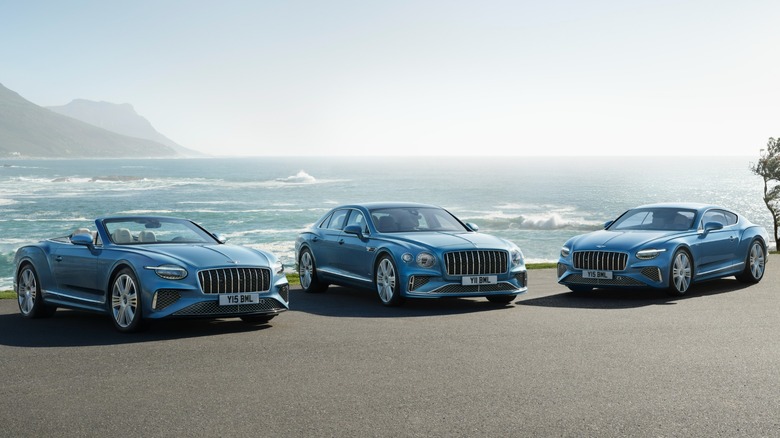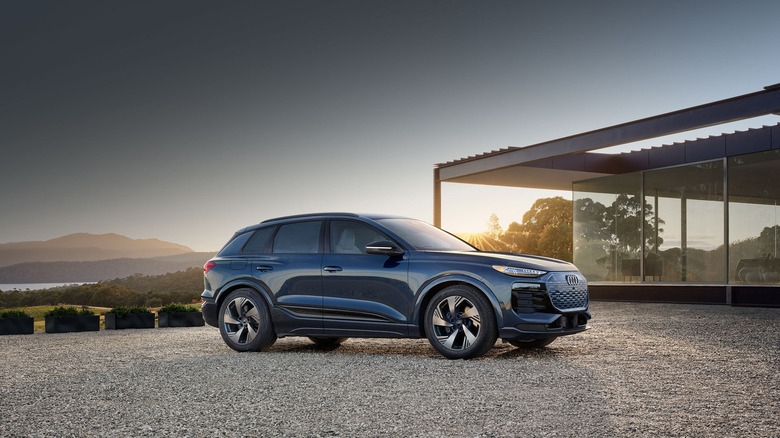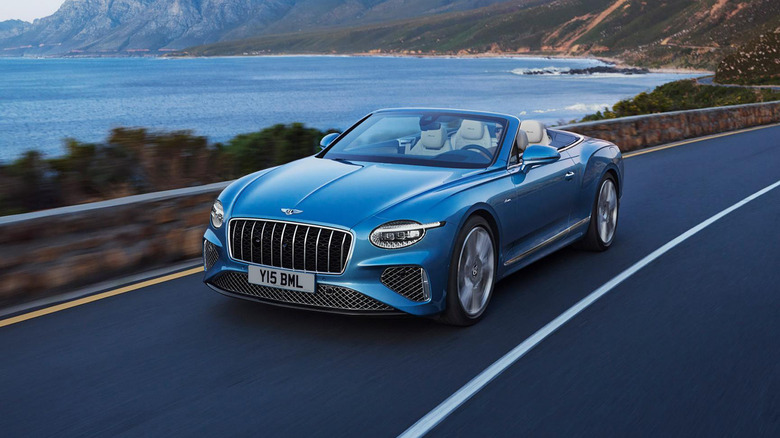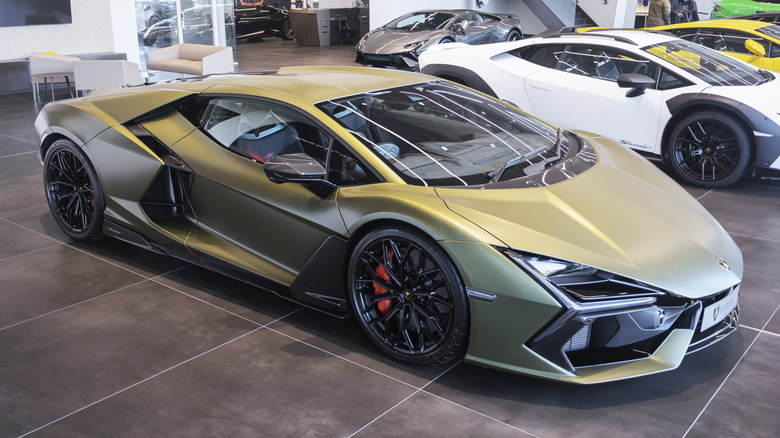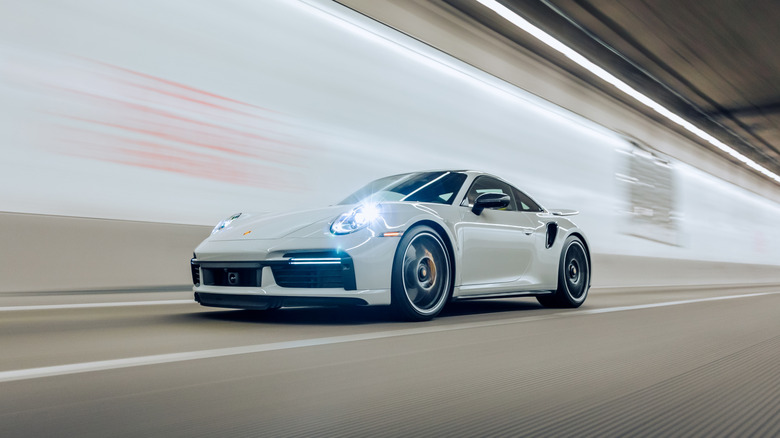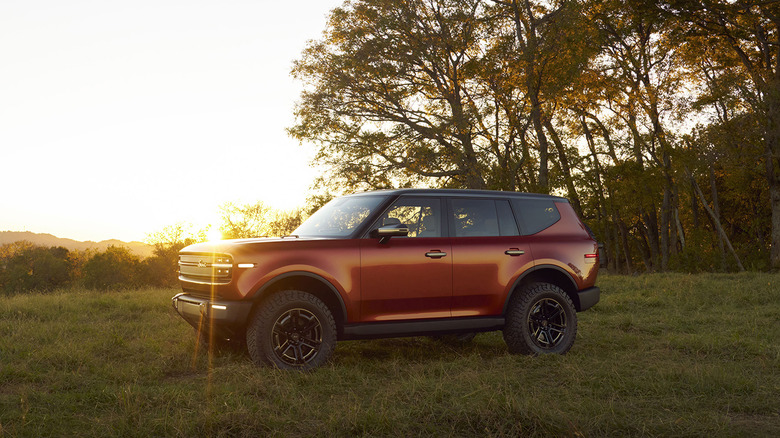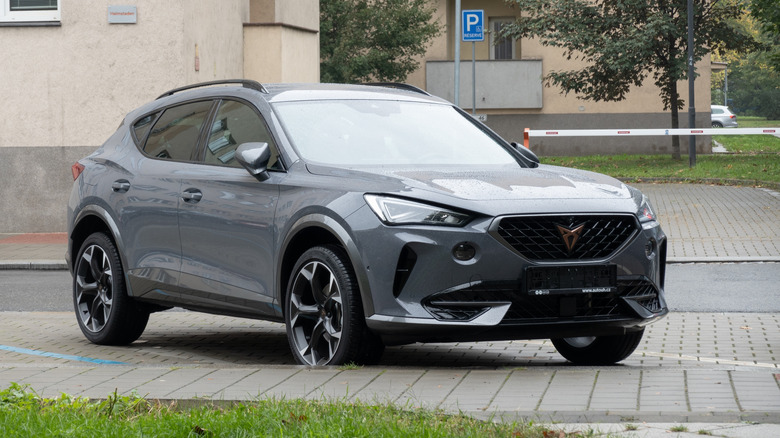6 Car Brands You Might Not Realize Are Owned By Volkswagen
Ever since the company was founded in 1937 by the German Labor Front, Volkswagen has developed into one of the largest automakers on the planet. Still producing its vehicles in Wolfsburg, the city where the brand's first-ever factory was constructed in 1938, the iconic German manufacturer has established its presence in many different markets, both through its in-house vehicles and the brands that it has acquired over the years.
Volkswagen has created some of the most influential cars in automotive history, starting with introducing what we now recognize as the Beetle in 1938. Designed by Ferdinand Porsche himself, it was intended as an affordable, practical car that everyone could own and use — the people's car. World War II limited the planned production of the Volkswagen, but sales of the Beetle topped 23 million by the time it was discontinued in 2019. The success helped pave the way for Volkswagen's future launches, and the brand now competes at the top of ultra-competitive segments in the industry with models such as the Tiguan and the Jetta.
Aside from those covered in this list, Volkswagen also owns Skoda, which sells cars in key European and Asian markets but has no current plans to enter the U.S. The German manufacturer has also made significant investments in startups such as Rivian, with a first-time investment of a whopping $1 billion. They also acquired the major motorcycle brand Ducati in 2012, and owned Bugatti until they sold the brand to Rimac in 2021.
Turning back to the established brands under its ownership, here are six brands you might not have thought were related to Volkswagen.
Audi
Audi itself is one of the largest automakers on the market, and has been for some time. While it isn't quite as popular in the U.S. compared to its German rivals in BMW and Mercedes-Benz, it still ranked as the 17th best-selling car brand in the country throughout 2024, with a total of 196,576 units being delivered to customers.
Audi and Volkswagen's relationship dates back to 1965, when the latter became the majority shareholder in Audi before it became an official subsidiary one year later. Audi — known as Auto Union at the time — was failing under Daimler-Benz's ownership, and over the decades after Volkswagen took over the brand, it has established its presence within the luxury and performance niches and then some.
Today, the German brand offers a much more expansive choice of cars and SUVs when compared to its parent company. Audi covers almost every segment in the industry, from smaller yet well-equipped sedans like the A3 and A4 sedans, to the Q6, Q7, and Q8 SUVs sitting at the opposite end of the market with much higher price tags. Alongside its combustion-engined models, Audi has been increasing the production of its electric e-tron lineup, with the Q6 e-tron joining the ranks alongside SUVs such as the Q4 e-tron and Q8 e-tron.
One of the brands that fall under the Volkswagen Group's progressive labels, Audi has the goal of pushing the conglomerate towards an electric future. While Audi remains a key player in the shift towards electrification with its expanding e-tron range, the target to exclusively produce electric vehicles after 2032 has been thwarted due to low sales and a continuing demand for combustion-powered cars.
Bentley
Bentley is among most iconic and established luxury car brands in history. However, even though it was founded in 1919, Bentley can't quite be included with the oldest car brands in history — or even be named the oldest brand under Volkswagen's ownership.
That title goes to Skoda, which was founded in 1895. Volkswagen's ownership of Bentley, meanwhile, began in 1998 when the Vickers Group sold Rolls-Royce, who owned Bentley at the time, to the German automaker, but Volkswagen didn't actually receive the rights to use the Rolls-Royce name. Those rights would eventually be sold to BMW, who now run the Rolls-Royce brand.
Despite this, Volkswagen remained determined to continue Bentley's legacy as a leading brand in the luxury segment. Today, Bentley has a total of five vehicles available, two of which are different versions of the iconic Continental grand tourer alongside the Bentayga SUV. The brand's historic coachbuilding services are also available through the Mulliner model, allowing customers to choose every aspect of the car's design to their taste.
While officially owned by the Volkswagen Group, Bentley joined the Audi Group in 2022 to help strengthen the push for electrification in the luxury segment. However, Bentley finds itself in a similar position to Audi in that its initial plans to switch to EVs exclusively have been delayed. The original target was 2030, but Bentley announced it would carry on producing its long-standing combustion-powered cars until 2035.
Although the British automaker doesn't have an all-electric vehicle in its current lineup, the first Bentley EV is set to be unveiled soon and the company will continue to roll out new electrified models until the 2035.
Lamborghini
Another brand that Volkswagen owns but falls under the Audi Group is Lamborghini. Ever since Ferruccio Lamborghini decided to make the switch from producing tractors to some of the fastest cars on the road in 1963, his brand represented what it means to be a true performance manufacturer. Lamborghini was acquired in 1998, and while it took until 2022 for Bentley to be placed under the Audi Group, Lamborghini was placed under Audi's leadership from the get-go.
Since then, Lamborghini has produced legends of the performance scene such as the Gallardo, Murcielago, and the Aventador. Lamborghini's current lineup is as exclusive as you'd expect with the Revuelto supercar – which earned its place as an Editor's Choice car for SlashGear – and the Urus SUV leading the charge for the Raging Bull. The long-lived Huracan was discontinued in 2024, although its replacement, the Temerario, is announced but not yet available for purchase.
Despite its lineup being much more limited compared to Audi or Volkswagen's in-house models, the Italian brand is no stranger to electrification. The Revuelto is the first model part of the new High Performance Electrified Vehicle category – also abbreviated to HPEV – using three electric motors in combination with a 6.5L V12 combustion engine to reach a total power output of 1001 horsepower and 535 lb-ft of torque. The upcoming Temerario will also fall under this label.
Lamborghini does also have its first-ever all-electric vehicle on the way, the Lanzador, which is now set to be released in 2029 after a one-year delay.
Porsche
Unlike Audi, Bentley, and Lamborghini, Porsche is not listed within the Brand Group Progressive segment of the Volkswagen Group, but still plays a significant part in keeping the conglomerate competing at the top of the electrified segment on multiple fronts.
Porsche is one of the more recent purchases made by Volkswagen, becoming the majority shareholder in the manufacturing company in 2012. We've already mentioned the founder of the brand, Ferdinand Porsche, for his contribution to the development of Volkswagen's first car, but Porsche as a brand began a few years before in 1931, and has since evolved into one of the most renowned automakers in history.
The 911 sports car has become a staple model of the Porsche brand, with the first model released in 1963 and remaining in the lineup for 2025. It has gone through eight generations over the years, including the current 992 model, but the new 911 Carrera GTS T-Hybrid is without a doubt one of the most monumental changes for the icon by introducing an electrified powertrain. Besides the 911, Porsche has been a major name in the luxury performance EV scene since the Taycan arrived in 2019. The Macan SUV has also recently gone electric (alongside the combustion model), and an electric Cayenne will join the lineup for 2026.
Despite not being a part of Volkswagen's progressive group of brands, Porsche continues the trend of pushing the conglomerate's portfolio of automakers towards a primarily electric future. Porsche had a similar goal to Audi and Bentley for its electric future, with a target to have 80 percent of its models be EVs by 2030. However, like these brands, it has recently announced that these plans won't be going ahead due to the slower-than-expected growth for EVs industry-wide.
Scout Motors
Few vehicles were as influential to the SUV and pickup truck scene as the Scout truck back in the 1960s and 1970s. Produced by International Harvester, which became Navistar in 1986 and then International Motors in 2024, the manufacturer set out to produce the most practical vehicle on American roads and take the fight to Jeep. The first Scout Motors model was released in 1961 and ran until 1980. The Volkswagen Group then purchased International Motors in 2021 and financed the launch of the new Scout Motors brand in 2022, bringing the iconic nameplate back to the U.S. market after more than 40 years.
There's no shortage of off-road focused pickup trucks on the market from the Major American automakers, giving Volkswagen good reason to decide to enter the segment. The newly formed Scout Motors unveiled its first two all-electric models in October 2024 – the Traveler SUV and the Terra pickup truck — both of which are set to enter production in 2027. These new offerings retain the design characteristics of the original International Scout vehicles but with a modern touch, keeping it in line with its soon-to-be competitors from the likes of Rivian and GMC.
The Volkswagen Group is hoping that Scout Motors will be its way to break into one of the most competitive segments in the industry, and the two announced all-electric SUVs won't be the only models it produces. When Scout Motors revealed the Traveller and Terra models, it also said that plug-in hybrids, referred to as extended-range electric vehicles, will also be on the way in response to the slow adoption of EVs in the States, becoming another brand under Volkswagen Group's ownership to change course to protect itself from the ever-changing market.
Seat/Cupra
Founded in 1950 by the Spanish National Institute of Industry, Spanish banks, and Italian automotive giant Fiat, Seat has become one of the most important companies to come out of the European nation. Today, Seat sells its cars in over 70 countries around the world, but has never made it to the United States.
Volkswagen and Seat's partnership dates back to 1982. Thanks to the success both sides saw, the Volkswagen Group eventually became the sole owner of the brand by 1990. In the next decade, the Cupra performance division was introduced to the brand's road cars in 1996 and has since been transformed into a separate brand, going independent in 2018.
While Seat will stay out of America, Cupra has plans to enter the U.S. market by the end of this decade with a wider range of models than originally anticipated. By this point, it's become commonplace for brands under Volkswagen to reassess their electrified future, and Cupra is no exception. Instead of offering electric vehicles only, U.S. buyers will now have the choice between combustion-powered, plug-in hybrid, and all-electric Cupras, but we're yet to see what models the Spanish brand will bring when the time comes.
Despite this change, Cupra still plans to produce electric-only vehicles from 2030, with no current signs of backing down from this goal, unlike the other brands under Volkswagen's ownership.
